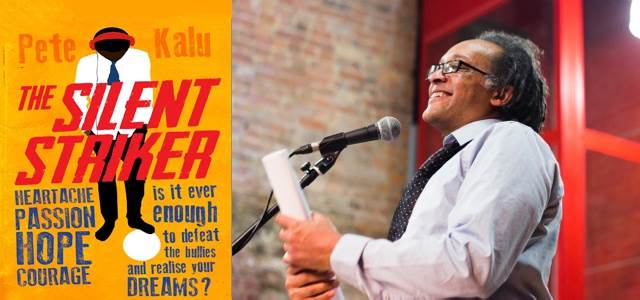'This book is for all the young people who feel different'
Published on: 05 February 2016 Author: Alex Strick
The Silent Striker looks at the typical issues that face a teenage boy: football, family, girlfriends and friendship. And this boy just happens to be losing his hearing, too.
Author Pete Kalu caught up with us to explain why no single theme dominates in this book. Instead, what links the issues is a look at those special, intense moments that tend to flood you when you're young.

Is Marcus's experience based on your own?
Marcus's journey describes - with ample doses of poetic license - the one I took when I started going deaf around age 15.
As a prolific writer, I have written about every subject under the sun - but not deafness. With The Silent Striker, I turned to that subject.
It is based on my lived experience, and the experiences of other hearing-impaired people I know.
Can you tell us more about your own experiences?
Looking back, my first instance was when those digital wrist watches came out that played tunes. Everyone on the school bus was raving about them but the frequency was too high for my hearing.
'Another memory that sticks out is a friend being really angry with me when I was about 15, saying I'd ignored her when we'd passed on the street. Of course, I hadn't heard her call out to me.'
Later, a university said I couldn't study their course because my deafness would make it impossible for me to hear the seminars and lectures. I eventually managed to persuade them to let me in. So, a mix of things.
Did anyone or anything else influence the book?
I became interested in consciousness as it relates to creative writing. I read Erving Goffman's Stigma. I also read Seeing Voices by Oliver Sacks(the late neurologist of The Man Who Mistook His Wife For A Hat fame).
Seeing Voices describes with scientific accuracy and deep reflection the unique, extraordinarily multi-dimensional and inventive world of deaf people.
The Silent Striker attempts to show Marcus's altering perceptions of the world, and his adjustments to it.
What did you want to say about deafness?
'I wanted to depict Marcus's journey into his new world without sentimentality or excessive simplification.'
I was aware of many clichés and tropes common to novels with a disabled character. So I didn't want a 'heroic rescuer', a non-disabled person who 'finds themselves' in helping him. His deafness is not 'cured' at the end of the novel.
What did you hope to say to young people?
The poet Audre Lorde talked in one of her essays about the loneliness of difference. How it takes courage to accept difference and to own it, to speak openly about it.
'If we stay silent until a time of fearlessness, until society as a whole is comfortable about talking of difference, then that silence will choke us.'
I want this book to speak to all those young adults who may feel different, and invite us all to embrace rather than shy away from our uniqueness.
The book also highlights racism in sport - is this something else you've encountered?
I was no football star myself. I was mainly the substitute on our high school team.
But one of my closest friends was on the books of a major UK football club when he was 14 - supremely talented, and black.
I saw some of the things that happened to him and it angered me how he was treated sometimes.
Do you hope The Silent Striker will avoid being 'labelled' as either a football or issue book?
I guess what links those four themes is 'intensity'.
'I was trying to write about those special moments when time slows, and you experience things that stay with you forever.'
I think that's what storytellers do. We cut out most of the dull bits and showcase the exciting moments. I try to weave comedy into the novel, too, to leaven the story - but without flattening the edges, if that makes sense.
What other books are in the pipeline - and would you consider writing a character with any other form of disability?
I'm currently writing a YA novel that combines zombies, the England team's World Cup 1966 victory, and my time as a substitute for our school team. That should be out this summer.
I have also planned a sequel to The Silent Striker. I might feature a blind kid in one of those books, to see if I can get the feel right. Maybe I can then give her or him their own story. That's how I tend to develop characters.
More generally, disability, even if at some degree of separation, is a part of all our lives. So in that sense, it's a part of all my characters, if I develop them fully.
Topics: 12+, Coming-of-age, Bookmark, Disability, Deafness, Interview, Diversity (BAME), Features





